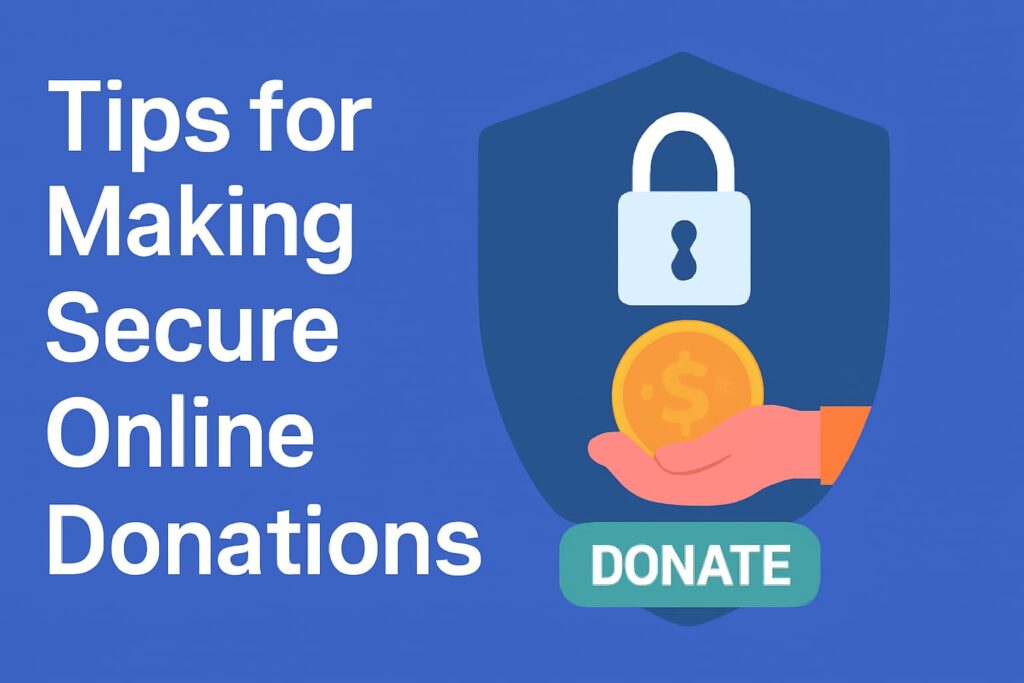In today’s digital world, online donations have become one of the most convenient and efficient ways to contribute to a cause, whether it’s for charities, crowdfunding campaigns, or personal fundraising efforts. However, as the number of online donation platforms grows, so does the risk of fraud and data theft. It’s essential to ensure that your donations are safe when transferring money online. In this guide, we will discuss how to donate money securely online, so you can support your favorite causes with peace of mind.
Why Secure Online Donations Matter
The rise of online giving comes with many benefits, but it also exposes donors to certain risks. Cybercriminals can target vulnerable donation pages, and without proper security measures, sensitive financial information, like credit card details and banking information, can be stolen. By following security best practices, you can ensure your donations reach their intended recipients without compromising your personal data.
Tips for Making Secure Online Donations
1. Choose a Trusted Donation Platform
When you decide to donate money online, it’s important to use a reliable and well-known donation platform. Trusted sites such as GoFundMe, JustGiving, PayPal Giving Fund, or direct charity websites have secure payment systems and data protection measures in place. Look for platforms that are certified and offer secure SSL encryption, which protects your personal information during the transaction.
2. Verify the Organization’s Legitimacy
Before donating, verify that the charity or cause is legitimate. Look for official charity registration numbers, check their website for contact information, and read reviews or ratings on third-party websites. Online reviews can provide valuable insights into whether the organization is trustworthy and whether other donors have had positive experiences.

3. Ensure the Website Is Secure
When making online payments, always check for a secure connection. Look for “https://” at the beginning of the website address and a padlock symbol in the browser bar. These indicators mean the website uses SSL encryption, ensuring your data is encrypted and secure during the donation process.
4. Use Payment Methods That Offer Protection
Using secure payment options like credit cards, PayPal, or Apple Pay offers an extra layer of protection compared to direct bank transfers. These payment systems often come with fraud protection measures, such as dispute resolution and chargeback options, which can protect you if something goes wrong.
5. Avoid Public Wi-Fi
Making donations while connected to public Wi-Fi can expose you to significant risks, as public networks are more vulnerable to hacking. To keep your transaction secure, always use a private, secure connection such as your home Wi-Fi or mobile data when making an online donation.
6. Beware of Phishing Scams
Phishing scams are fraudulent attempts to steal your personal information by posing as a legitimate organization. Be cautious of unsolicited emails or messages asking you to donate money. Always navigate to the organization’s official website directly through your browser rather than clicking on links in emails or text messages. Double-check the sender’s email address and ensure it matches the organization’s official domain.
7. Set Up Two-Factor Authentication (2FA)
Many secure donation platforms and payment services offer two-factor authentication (2FA) as an added layer of protection. When you enable 2FA, you’ll be required to provide a second form of identification, such as a code sent to your phone or email, in addition to your password. This helps prevent unauthorized access to your donation account.
8. Keep Track of Your Donations
After making a donation, make sure to keep a record of the transaction. Most reputable platforms will send you an email confirmation or a receipt for tax purposes. By tracking your donations, you can ensure that the money was transferred correctly and keep an eye out for any suspicious activity on your account.
How Online Donation Systems Work
To further understand how to donate securely, it’s helpful to know how online donation systems operate. When you enter your payment information, the website’s secure connection encrypts your data before sending it to a payment processor. The processor then transfers the funds to the recipient’s account, ensuring that both the donor’s and the recipient’s information remains protected throughout the transaction.
Modern payment systems often use tokenization, where your sensitive card or account information is replaced with a unique code or token. This adds another layer of security by ensuring your data is never stored on the donation site.
Read More: How You Can Make a Real Difference: Donate to Help Poor FamiliesConclusion
Donating money online is a powerful way to support causes that matter to you. However, it’s essential to ensure your financial information is safe by following security best practices. Choose trusted donation platforms, verify the legitimacy of the cause, use secure payment methods, and avoid making donations over public Wi-Fi. By staying vigilant and following these steps, you can confidently make online donations while keeping your personal information secure.
FAQ’s: How to Donate Money Securely Online: A Step-by-Step Guide
What is SSL encryption, and why is it important for online donations?
SSL encryption ensures that any data exchanged between your browser and the website is encrypted, preventing cybercriminals from intercepting your personal and financial information during the transaction.
Can I donate securely using PayPal?
Yes, PayPal is a secure payment method for online donations, as it offers fraud protection, buyer dispute options, and SSL encryption for secure transactions.
What should I do if I suspect a phishing scam while donating?
If you suspect a phishing scam, avoid clicking on links or downloading attachments in unsolicited messages. Instead, visit the organization’s official website directly to verify the legitimacy of the request.
How can I confirm that an online donation platform is trustworthy?
Look for platforms that have certifications or are affiliated with well-known organizations. Check for reviews, official charity registrations, and SSL security features.
Is it safe to donate using public Wi-Fi?
No, it’s best to avoid making donations while using public Wi-Fi, as it’s less secure and more vulnerable to hacking. Use private, secure connections whenever possible.





